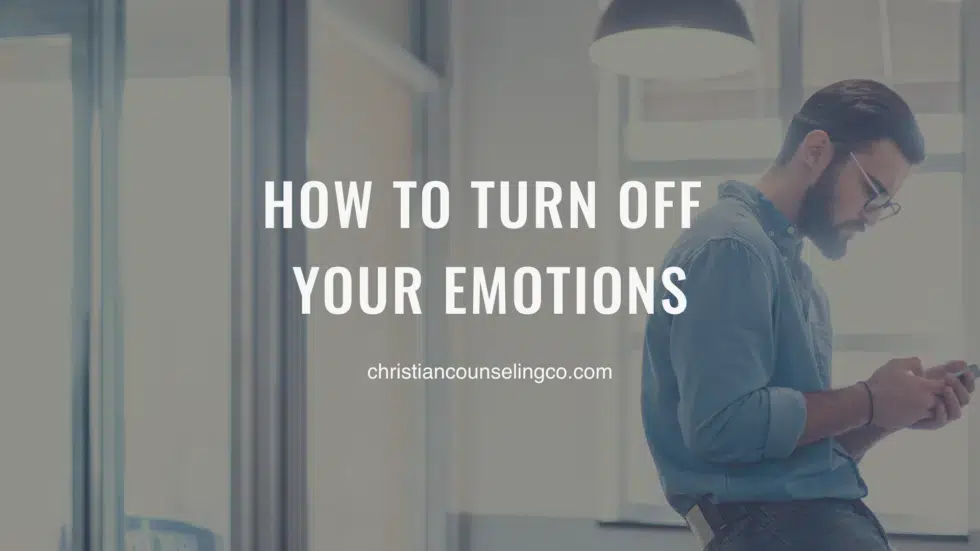Have you ever wondered how to turn off your emotions?
I know I have. Not all of them, mind you, just the ones I really don’t like feeling! But when asking God to turn them off I learned something that made me pause. I learned how emotions serve us.
They are our internal alarm system that signals to us when something is happening. They motivate and inspire us to take action. They help us connect with others as well as communicate our wants and needs.
As uncomfortable as they are to feel sometimes, emotions are not only vital to our survival, but to our pursuit of the abundant life that God has for us.
So how do you and I deal with painful emotions?
When we are in pain, we often look for a quick fix and find ways to turn off our emotions.
These come in the form of distractions: drugs, hyperfocus on work, overeating, pornography, exercise, volunteer work, etc. Some of these distractions are not bad in and of themselves. However, the consequence of using these distractions too often or for too long is to experience even more intense, prolonged pain.
Turning off emotions without digging into what led you to experience them in the first place is treating the emotions like they are the issue when they are not. The real issue remains unmanaged because we numbed ourselves to our internal alarm system.
The true problem gets bigger, louder, and more intense until we cannot ignore it anymore.
Do you want to know a better way to “turn off your emotions”?
Pay close attention to them. Stop fighting them. You are not your feelings. Validate your feelings’ existence and explore what they are telling you. In doing so, you can solve what triggered your emotions in the first place.
Read on for some excellent emotional regulation skills from the practice of Dialectical Behavioral Therapy (DBT):
1. Practice mindfulness to radically accept the present moment with all of the emotions, thoughts, behaviors, and events in it. This creates distance to truly see everything without judgment. It also allows for self-compassion.
2. Practice distress tolerance skills to slow down impulsive, harmful reactions. Try using TIPP: change the temperature of your face by splashing it with cold water. Do some intense aerobic exercise. Pace your breathing. And pair deep breathing with progressive muscle relaxation.
3. Explore what the emotions are trying to tell you by observing the facts without labeling them as good or bad. Identify events prompting the feeling, your interpretation (thoughts) of the event, physical reactions in your body, your resulting behaviors, any vulnerability factors (hunger, lack of sleep, a breakup, financial loss, etc.). Is there an actual threat or an assumed one?
4. After checking the facts, ask yourself if your emotion fits the facts you discovered. If yes, then you can engage in problem-solving behaviors. If no, then you can identify and do the opposite action of the behavior your emotions would normally lead you to do.
There are also proactive skills taught in DBT that we can practice to reduce our vulnerability or sensitivity to strong negative emotions. These are listed under the acronym ABC PLEASE.
A – Accumulate positive experiences and emotions, paying close attention to what you value in life as well as attending to your relationships
B – Build positive events and experiences both in the short term (focusing on things that are possible right now) and in the long term (investing in things that bring lasting happiness and contentment)
C – Cope ahead by preparing for emotional situations that you know could be triggering for you before they arise
P – Treat any physical illness
L – List your resources and barriers
E – Eat healthy meals
A – Avoid mood-altering substances
S – Get balanced sleep
E – Get regular exercise
It’s normal to want to turn off emotions sometimes, but it’s not actually beneficial. Jesus experienced painful emotions. He wept when His friend died. He got angry when people misused the Temple. He sweat drops of blood when asking His Father to “remove this cup from Me; yet not My will, but Yours be done” (Luke 22:42).
In His kindness, God called you to share in His eternal glory by means of Christ Jesus. So after you have suffered a little while, He will restore, support, and strengthen you. “He will place you on a firm foundation” (1 Peter 5:10).
Instead of trying to turn our emotions off, we can learn ways to regulate our strong reactions, lean on the promises of hope from the Lord, and leave space to experience our emotions with curiosity and compassion.







